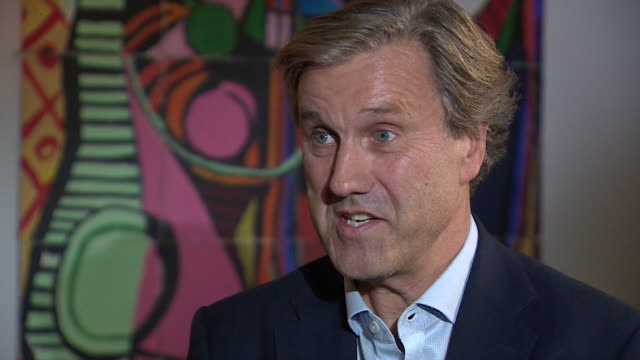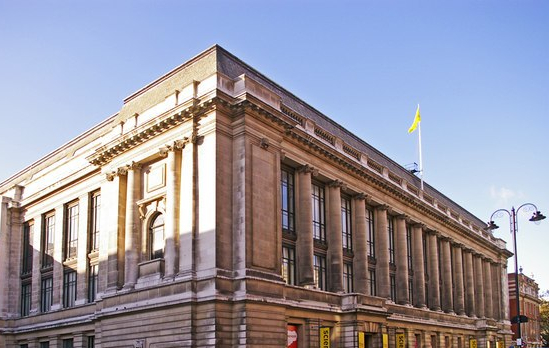February 2021
In recent years, the tide has been turning in the cultural sector, with a growing list of museums, galleries and theatres cutting their ties to fossil fuel sponsors, from the Royal Shakespeare Company and Tate dropping their BP sponsorship deals to Shell’s long-running partnerships with the National Theatre, Southbank Centre and BFI coming to an end. But as many cultural institutions have declared a climate emergency and shifted their approach to sponsorship, the Science Museum Group has notably done neither.
Ian Blatchford, the Director of the Science Museum Group, is well known for backing Big Oil – in 2019, he told the FT that:
“Even if the Science Museum were lavishly publicly funded I would still want to have sponsorship from the oil companies.”
And when a group of 48 highly-respected scientists, climate experts and naturalists raised their concerns about the museum’s partnerships with BP and Equinor, he made no response to them.

You can read our background to oil sponsorship of the Science Museum Group here.
Now, emails we have acquired through Freedom of Information (FOI) requests suggest that Blatchford and the Science Museum Group’s support for BP has gone beyond warm public words to actively helping the oil giant counter the growing opposition to its sponsorship deals. We now know that the same day that BP was telling civil servants it was ‘disappointed by the criticism’ it had been receiving over its arts sponsorship, Blatchford arranged an ‘informal chat’ with BP to discuss exactly that issue. BP would later be invited in to present and defend its business activities to museum staff and trustees in sessions billed as:
“An opportunity to understand why the energy sector sponsors cultural organisations.”
Of course, the reason BP sponsors cultural institutions is already well-known: to buy some much-needed social legitimacy as the climate crisis intensifies.
Countering critics of the museum’s approach to sponsorship
Over the course of June and July 2019, oil sponsorship was hitting the headlines as a series of high-profile figures spoke out: artist and judge of the BP Portrait Award Gary Hume on June 10th, actor Sir Mark Rylance resigned from the Royal Shakespeare Company over BP sponsorship on 21st June, and British Museum trustee Ahdaf Soueif resigned on 15th July, prompting a statement of support from British Museum staff on 23rd July.
In response to this growing opposition – as well as mounting criticism of the SMG’s stance on oil sponsorship – the Director Ian Blatchford sent a lengthy – and highly defensive – email to the entire 1,300 workforce of the Science Museum Group on the 30th July 2019. In that email, he argued:
“Whilst the global economy remains carbon intensive, the energy companies conduct extensive research into a wide range of new technologies to reduce our dependence, including carbon capture, fuel efficiency and alternative energy… I am very sceptical about the trite argument that such sponsorships are greenwashing.”
That lengthy email was reported on in the FT although the full text has not been made publicly available before now – you can read it in full here. The move appears to have been a response to unease among staff about the museum’s stance on sponsorship, with Blatchford telling the FT that some staff had ‘misunderstood the museum’s rationale’ for accepting oil money:
“Some of my junior colleagues were thinking that we would simply accept money from anyone and weren’t asking any tough questions at all.”
Blatchford published a version of that email on the Science Museum Group’s blog three days later – minus its outspoken criticism of Tate and those institutions cutting their ties to fossil fuels – but retaining his defence of the fossil fuel industry and the museum’s partnerships with BP and Equinor:
“The major energy companies have the capital, geography, people and logistics to be major players in finding solutions to the urgent global challenge of climate change and we are among the many organisations that regard the approach of severing ties as being unproductive.”
While other cultural institutions claim to take a more detached, neutral approach to their oil sponsors, Blatchford has stood apart in making such direct defences of his sponsors’ controversial business activity.
However, emails released following our FOI request have revealed that Ian Blatchford made arrangements to have an “informal chat” with BP to discuss arts sponsorship the same day he sent that original email to staff. A member of staff from BP, who is presumably Vice President Peter Mather, asks:
In reply, Blatchford says:
See the emails in full here.

What wasn’t a weird coincidence though was that BP had also met with the ‘Energy Diplomacy Team’ at the Department for Business, Energy and Industrial Strategy (BEIS) the same day and, despite that meeting being primarily about energy policy, notes reveal how BP took the opportunity to raise concerns about opposition to its sponsorship deals.

See the meeting readout in full here.
A coordinated defence against opposition to oil sponsorship
The following day on the 31st July 2019, Culture Unstained had agreed to take part in a “ThinkIn” panel discussion hosted by Tortoise Media – also sponsored by BP – alongside Peter Mather, Vice President of BP and Richard Lambert, Chairman of the British Museum. Even though Blatchford’s email had only been sent to staff at the SMG the day before, the Editor of Tortoise Media – who was chairing the discussion – had already acquired a copy which he proceeded to quote from during the event.

Ian Duffy, then Head of UK Communications and Community at BP was also at the ‘ThinkIn’. But emails released to us under FOI reveal that he had fed back to the Director of the Science Museum Group by email just a few hours later, noting:
“I think that much of the issue [around opposition to fossil fuel sponsorship] is a failure of the industry to engage properly over recent years over the actions we are actually taking on the energy transition.”
However, emails show that the Director of the SMG had already had ‘a long chat’ with Ian Duffy’s colleague – presumably BP Vice President Peter Mather. He cryptically writes:
“We have a project idea that he will brief you about……”

See the emails in full here.
Providing a platform for BP to defend its business
Two ‘Funder Q&A Sessions with BP’ were then scheduled for November 2019, providing a dedicated opportunity for BP to defend its business directly to an audience of SMG staff. An invitation email makes the motivation behind the event clear:
“This is an opportunity to understand why the energy sector sponsors cultural organisations”
View the emails in full here.

The two talks, one at the National Science & Media Museum in Manchester and one at the Science Museum in London were rescheduled to January, noted in emails here. But it was clear that the Director and senior management were eager that staff – and even trustees – should attend. Minutes from the Board of Trustees meeting on the 4th December 2019 recorded:

An internal email, sent the following day, also reflected this eagerness to make sure as many as possible attended the events with BP.

View the emails in full here.
However, while invitations to the workshops were sent widely to staff, trustees and the museum’s advisory board, they specified that:
“We would appreciate you not circulating this invitation more widely.”
“Getting our story in shape”
On the 18th November 2020, it was publicly announced that the SMG had become a member of the Transition Pathway Initiative (TPI), an initiative aimed at investors that assesses “companies’ preparedness for the transition to a low-carbon economy”. A post on the TPI website which announced the SMG’s membership overwhelmingly focused on corporate partners, noting that:
“Today, society and public institutions expect corporate partners to behave in an ethical and sustainable way.”
It later adds that:
“The Science Museum Group encourages corporate partnerships with firms that share its vision for a progressive transition to a low-carbon economy, even if they are currently high emitters.”
However, analysis put together by TPI just a month earlier in October 2020 had found that:
“No fossil fuel energy major has yet set an emissions target in line with limiting climate change to 2°C.”
And that the pledges fossil fuel companies have set are:
“Widely regarded as insufficient to avert dangerous climate change (leaving the world on track for 3.2°C of warming according to UNEP [the United Nations Environment Programme]).”
TPI’s findings came after many of these companies had begun announcing various “ambitions” to become “net zero by 2050”. It was a clear statement that oil and gas majors – including the SMG’s sponsors BP and Equinor – were not behaving in an ethical or sustainable way.
However, as the workshops with BP were being planned a year earlier, the museum’s engagement with TPI was already in the pipeline but seen as a potential way to counter criticism of its stance on sponsorship and sustainability. When a staff member asks for approval of text that would promote the workshops with BP to the museum’s Board, they are advised that “getting our own story in shape, eg use of TPI” is “more pressing”.

See the emails in full here.
Back in January, BP still had around 97% of its investments in fossil fuels. (Despite making hefty losses since then, BP still plans to put $9 billion – around 70% of its investments – into oil and gas this year.)
And yet an internal event briefing for the workshops presented BP as an ethical sponsor that was working towards “meeting the Paris Agreement”:

See full event briefing by clicking here.
In fact, the slides from BP’s presentation at the workshop itself didn’t hide the fact that the focus of the company’s business was – and would remain – oil and gas.

The opening slide though outlined the many different forms BP’s sponsorship of the Science Museum has taken since 2002, and primarily projects that target young people. The first project cited was BP’s sponsorship of the Science Museum’s ‘Energy: Fuelling the Future’ gallery, which still exists today. While it’s not clearly stated within the museum, that gallery was created in direct collaboration with a ‘BP Advisory Board’ formed of ten members of the oil giant’s staff. Today, it is the sponsor of a STEM Academy for training educators.

See BP’s full presentation slides here.
Since 2003, BP has invested billions in new oil and gas, relentlessly lobbied against climate action and spread misleading greenwash. Today, BP’s “ambition” to become net zero by 2050 might sound like a step in the right direction. But that ambition is non-binding, full of loopholes and falls way short of what the Paris Agreement requires and the science demands.
It’s bad enough that the Science Museum Group has offered BP so much social legitimacy and over so many years. What’s worse is that when those sponsorship deals came under legitimate scrutiny by artists, actors, scientists and campaigners, the Director worked with BP to help the company counter the criticism.
